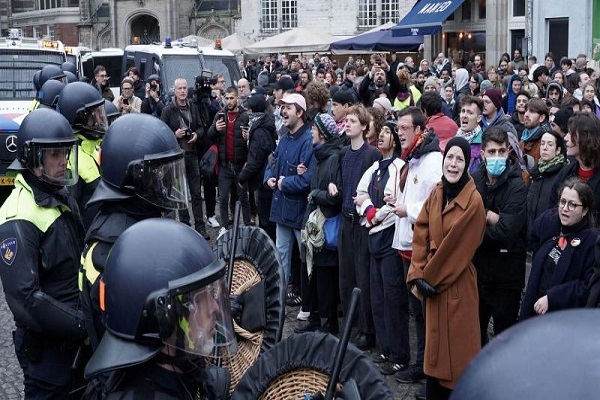AhlulBayt News Agency (ABNA): Muslims in the Netherlands are worried that how the government is reacting to last week’s violence over a football match could encourage discrimination.
Arranging fruit crates in a market on the western edge of Amsterdam on Thursday, Mohamed Errakil said the Dutch government’s rhetoric a week after the city was shaken by the violence is worrying.
“We’re called foreigners, you’re a Moroccan, you’re a Turk. Discrimination is going to build up” said Errakil, a 51-year-old of Moroccan origin who says he “feels Dutch” and has spent most of his life running a fruit stall in Nieuw West, a neighborhood with a sizeable Muslim population.
In the Dutch parliament a day earlier, far-right MP Geert Wilders said all the violence surrounding last week’s football match between Ajax Amsterdam and the Israeli regime’s Maccabi Tel-Aviv was perpetrated by Muslims and “for the most part Moroccans”.
Anti-Islam Wilders, who is leader of the largest party in the government coalition, also called for the attackers to be prosecuted “for terrorism, lose their passports and be kicked out of the country”.
Now “every Muslim is seen as a foreigner, a terrorist, but they’re not”, said the fruit vendor.
Like other locals at the market in the Plein ’40-’45 square, scene of isolated rioting on Monday night, Errakil urged the government and media to look at “both sides” of the issue.
Last week, the Israeli teams fans initiated provocations and violence after the match in Amsterdam.
Ahead of the football match, Maccabi fans had chanted anti-Arab slogans around Amsterdam, vandalized a taxi and burnt a Palestinian flag in the city’s main square.
While opposition politicians have called for unity and criticized Wilders for “adding fuel to the fire”, Prime Minister Dick Schoof also singled out the attackers as having an “immigration background”.
Condemning the violence as “Jews being hunted down”, Schoof said the Netherlands had an “integration problem”.
Steaming cup of tea clasped in hand, clothes vendor Abdeslam said there was “absolutely no hatred of Jews”. Instead, he said he was “against Zionism” and “concerned about right-wing populism”.
Abdeslam only gave his first name and did not want his face to be filmed, fearing far-right reprisal.
“I find that regrettable that people are still talking about integration”, added the 42-year-old, whose stand also sells keffiyehs, the scarves that have come to symbolize support for the Palestinian cause.
“Look, if we were in the 1980s or 1990s, I could understand, but now you’re talking about youth of third, fourth, maybe fifth generation.
“So, there is absolutely no integration problem there.”
Earlier this week, Schoof met Jewish community leaders and is set to announce a raft of measures to tackle “anti-Semitism”, including harsher sentences for the perpetrators.
Known for being a tolerant and multicultural city, Amsterdam has struggled with the polarization seen across Europe since the start of the Israeli regime’s genocidal war on the Gaza Strip last year.
Tensions remain high following the violence with a ramped-up police presence after hundreds of pro-Palestinian protesters were arrested for twice defying a ban on demonstrations in the last week.
Rita Silva, 24, an art school student in Amsterdam who lives in the neighborhood, came to buy a keffiyeh from Abdeslam’s stall.
Having taken part in pro-Palestinian protests since the Israeli war began, Silva said the “police violence has just been rising” against protesters, who also denounced the treatment of Muslims by the Maccabi fans and politicians.
Leaning against the wooden beams of his clothes stall, Pete, 66, who used a pseudonym and has been working at the market for fifteen years, said people from the local Muslim community were “very, very anxious now”.
“They are sad, they are disappointed. The government doesn’t see them like real Dutch people, but like they are a second-class people.”
......................
End/ 257

